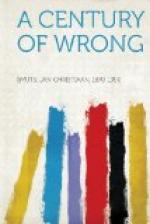Another murder and deed of shame in South Africa’s account with England!
[Sidenote: Annexation of the Orange Free State]
In the meantime Sir Harry Smith had annexed the Free State as the “Orange River Sovereignty,” on the pretext that four-fifths of the inhabitants favoured British dominion, and were only intimidated by the power of Pretorius from manifesting their wishes.
[Sidenote: Moshesh]
But the British Resident soon came into collision with Moshesh, the great and crafty head chieftain of the Basutos.
The Boers were called up to assist, but only 75 responded out of the 1,000 who were called up. The English had then to eat the leek. The Resident informed his Government that the fate of the Orange River Sovereignty depended upon Andries Pretorius, the very man on whose head Sir Harry Smith had put a price of L2,000. Earl Grey censured and abandoned both Sir Harry Smith and the Resident, Major Warden, saying in his despatch to the Governor dated 15th December, 1851, that the British Government had annexed the country on the understanding that the inhabitants had generally desired it. But if they would not support the British Government, which had only been established in their interests, and if they wished to be freed from that authority, there was no longer any use in continuing it.
[Sidenote: The Orange Sovereignty once more a Republic.]
The Governor was clearly given to understand by the British Government that there was in future to be no interference in any of the wars which might take place between the different tribes and the inhabitants of independent states beyond the Colonial boundaries, no matter how sanguinary such wars might happen to be.
In other words, as Froude says, [15] “In 1852 we had discovered that wars with the Natives and wars with the Dutch were expensive and useless, that sending troops out and killing thousands of Natives was an odd way of protecting them. We resolved then to keep within our own territories, to meddle no more beyond the Orange River, and to leave the Dutch and the Natives to settle their differences among themselves.”
And again: [16] “Grown sick at last of enterprises which led neither to honour nor peace, we resolved, in 1852, to leave Boers, Kaffirs, Basutos, and Zulus to themselves, and make the Orange River the boundary of British responsibilities. We made formal treaties with the two Dutch States, binding ourselves to interfere no more between them and the Natives, and to leave them either to establish themselves as a barrier between ourselves and the interior of Africa, or to sink, as was considered most likely, in an unequal struggle with warlike tribes, by whom they were infinitely outnumbered.”
The administration of the Free State cost the British taxpayer too much. There was an idea, too, that if enough rope were given to the Boer he would hang himself.




